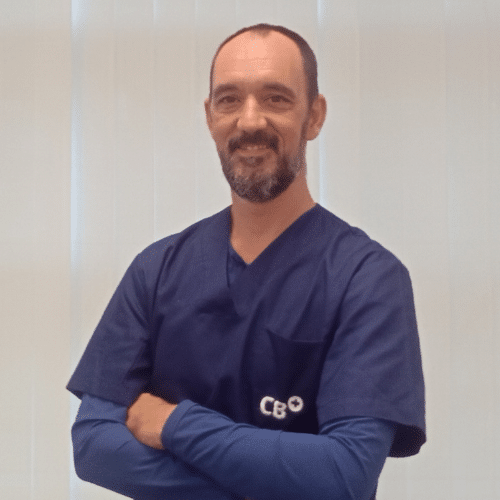Paediatric respiratory physiotherapy in the treatment of bronchiolitis and bronchitis in children
The first years of life are a particularly delicate stage for children’s respiratory health. During this period, illnesses such as bronchiolitis and bronchitis are very common, especially during the colder months or during viral outbreaks.
Although in many cases these are mild conditions, in younger children —especially those under three years old— they can cause significant breathing difficulties, affecting both the child’s wellbeing and the peace of mind of their families.
To help prevent relapses and reduce the duration or intensity of symptoms, respiratory physiotherapy is an effective complementary tool to pharmacological treatment. Moreover, it is a manual, safe and non-invasive therapy.
What is the difference between bronchiolitis and bronchitis?
Bronchiolitis is an acute respiratory infection that mainly affects the bronchioles, the smallest airways in the lungs. It is usually caused by the respiratory syncytial virus (RSV), responsible for many cases of breathing difficulties in infants.
Bronchitis, on the other hand, affects the bronchi, the larger airways, and can have either a viral or bacterial origin. It may appear as an acute (temporary) or chronic (longer-lasting) condition. In some cases, bronchitis is diagnosed when a child suffers three or more episodes of bronchiolitis during the same winter.
Although most cases are mild, these conditions can cause breathing difficulties, coughing, mucus build-up and, in some cases, fever, vomiting or feeding problems.
What difficulties can a child with respiratory problems experience?
Build-up of secretions:
Babies and young children with respiratory problems cannot easily expel mucus, which can block the airways, cause difficulty breathing and increase the risk of complications.
Feeding difficulties:
Nasal congestion and the effort required to breathe make them tire quickly while feeding, which can affect their nutrition and growth.
Sleep problems:
Persistent coughing and discomfort make it harder for them to sleep at night, affecting their overall wellbeing and daily energy.
Episodes of severe breathing difficulty:
In more serious cases, rapid breathing, chest retraction or bluish colouring of the lips and fingers may appear, which can require immediate hospitalisation.
What does paediatric respiratory physiotherapy offer?
Paediatric respiratory physiotherapy is a safe and effective treatment that helps relieve respiratory symptoms in children, clear mucus, improve breathing and enhance their overall quality of life.
Through gentle, age-appropriate techniques, the paediatric physiotherapist helps the child breathe more easily, reduce coughing and sleep better — bringing greater peace of mind to their family.
Main benefits of respiratory physiotherapy for children
- Promotes mucus clearance and reduces congestion through manual techniques.
- Improves breathing and oxygenation.
- Reduces coughing, improves sleep and supports more regular feeding.
- Lowers the risk of complications (such as pneumonia) and hospital admissions.
- Provides families with guidance on how to act at home and prevent future relapses.
- Can moderately shorten recovery time.
When is paediatric respiratory physiotherapy recommended?
- Paediatric respiratory physiotherapy is particularly recommended in the following cases:
- Moderate or severe bronchiolitis in babies and young children, with excessive upper and lower airway secretions.
- Bronchitis with persistent symptoms affecting breathing and rest.
- Children with recurrent respiratory episodes requiring specialised follow-up and ongoing treatment.
- Premature babies or those with previous respiratory conditions who are more vulnerable.
Contraindications before a paediatric respiratory physiotherapy session
- High fever.
- Recent thoracic surgery.
- Avoid feeding just before the session.
Support and reassurance for families
At CreuBlanca, we understand that behind every child there is a family seeking guidance, safety and relief. That’s why our team of physiotherapists specialised in paediatric respiratory care work in close coordination with paediatricians and paediatric pulmonologists to provide comprehensive and personalised care.
Our goal is twofold:
- Help children regain natural, healthy breathing.
- Give families the tools they need to face these episodes with greater confidence and peace of mind.
How to improve children’s respiratory health with CreuBlanca
Bronchiolitis and bronchitis are common illnesses during early childhood, but with early diagnosis and a comprehensive approach —including paediatric respiratory physiotherapy— it is possible to improve recovery and enhance quality of life for the little ones.
At CreuBlanca, we support children’s health through a multidisciplinary approach, ensuring both their wellbeing and their families’ peace of mind, thanks to a specialised team and advanced technology that is constantly evolving in paediatrics and respiratory physiotherapy.
Respiratory physiotherapy cannot prevent future infections, but it provides safety, confidence and close support throughout the recovery process.
Trust CreuBlanca. Trust Respiratory Physiotherapy.

